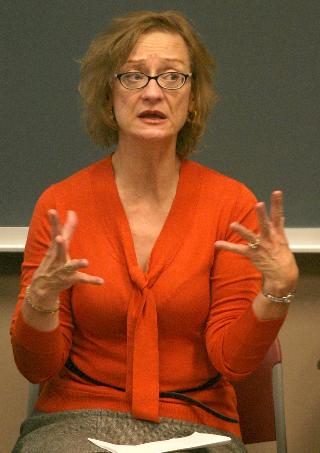Health care reform debated
College-aged people, 18 to 29 year olds, need to think about the health care issue and become informed, said history professor Bailey Young in the opening statement for an open health care forum.
The forum was held Monday night in Lumpkin Auditorium. Members of a faculty panel were given an opportunity to discuss their particular point of view, and then all fielded questions from members of the audience.
The U.S. Senate will vote on the health care reform bill today.
First to speak was history professor Lynne Curry, who has been studying health care in America since beginning her doctoral dissertation.
She said America has had many attempts to reform the health care system but few have been successful on the federal level.
“I wonder if some of the debate we are seeing over this issue is a result of age discrepancies,” Curry said.
She referred to an Oct. 11 editorial titled “Think About the Grandkids” in the New York Times by Eduardo Porter, which states that 20 percent of people 65-and-over support the president’s efforts while 59 percent of those aged 18 to 44 support the government’s guaranteeing health insurance for all.
Peter Andrews, professor and chair in the department of mathematics and computer science, followed with his perspective as a Canadian citizen.
He said he and most other Canadians are satisfied with their nations current health care system.
The Canadian health care system is publicly funded and most services are provided by private entities. It is guided by the provisions of the Canada Health Act.
Andrews said under this system, there is no wait for emergency care, it’s relatively inexpensive, and there is very little bureaucracy involved.
Andrews said most negative remarks regarding Canadian health care are baseless.
“It’s certainly not a failed system,” he said.
He gave an analogy showing his support for a public option within the American health care system.
“Imagine a world where you never have to walk in a diner and see a mayonnaise jar that reads, ‘Little Jimmie needs a bone marrow transplant, but his family cant afford it,'” Andrews said. “Well, with universal coverage that just wouldn’t happen, because Jimmie would get that transplant whether his family could afford it or not.”
Economics professor James Bruehler provided a skeptical outlook on the health care system. While Bruehler supports health care reform, he said in order to have universal coverage a public option is not needed.
“We need to be careful to not make it any worse than it already is,” he said.
Bruehler refuted Rebecca Merten’s comments during his allotted presentation time.
Merten, director of the nursing program, used life expectancy and infant mortality rates to support her view.
“We rank 30th of all 36 nations measured for infant mortality rate,” Merten said.
Bruehler said these figures should not be used to make a judgment on the state of American health care because they are affected by much more than health care. The panel also included Rich Wandling, professor of political science, and was moderated by Young.
Jason Hardimon can be reached at 581-7942 or jrhardimon2@eiu.edu.
Health care reform debated

History professor Lynne Curry describes the proposed changes to health care during the Health Care Policy Issues Panel in Lumpkin Hall auditorium Monday.(Danny Damiani/The Daily Eastern News)



































































